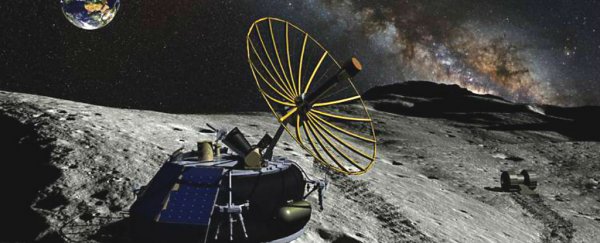The US government is set to give approval to California-based space company, Moon Express, to explore the surface of the Moon over a two-week period in 2017.
Moon Express has applied to have its MX-1 lander launch to the Moon next year, land on the surface, and conduct a series of analyses that will help prepare the company for potentially carrying payloads to the Moon in the future. If approved, this would be the first time a private enterprise - not a nation - has launched a mission beyond Earth's orbit.
The precedent that this could set would be huge, potentially opening up space exploration to anyone in the world who has the funds and the expertise, e.g. SpaceX, which just recently announced plans to get to Mars by 2018.
"Moon Express, I think, is paving the way for commercial activity outside of Earth orbit," Mariel Borowitz from the Sam Nunn School of International Affairs at the Georgia Institute of Technology, who is not involved with the company, told the Los Angeles Times.
Reports of the approval are coming from an investigation by Andy Pasztor from The Wall Street Journal, who announced today that the US Federal Aviation Administration (FAA) - which is responsible for approving all commercial rocket launches - is mulling over the terms.
It could take weeks or even months before the decision is made public, but representatives from Moon Express told Pasztor that they could not elaborate on the "groundbreaking developments", but they were "very optimistic" about the proposal.
The FAA itself disclosed that it is still ironing out the approval process, but it's working to ensure that a "mechanism is in place that permits emerging commercial space operations, such as the one that Moon Express has publicly commented on".
That sounds pretty promising to us!
So what is this MX-1 lander that could potentially take private enterprise beyond Earth's orbit for the first time ever?
Set to launch 2017 on Los Angeles-based company Rocket Lab's brand new Electron rocket, the MX-1 lander is powered by sunlight and hydrogen peroxide rocket fuel. Because this is essentially just an oxygen enriched water compound, Moon Express is looking into how they could use water on the Moon to supply MX-1 with fuel on its journey back home.
The coffee table-sized lander is equipped with everything it needs to drill into the surface of the Moon, collect samples, and fly them back home for analysis. Moon Express co-founder Bob Richards calls the MX-1 the 'iPhone of space'.
Of particular interest to Moon Express are platinum group metals, rare earth elements, and Helium-3, the latter which could be a safer nuclear fuel alternative, says Samantha Masunaga at the Los Angeles Times.
If the proposal is approved, Moon Express will likely be free to investigate the potential of 'Moon mining', but will still have to adhere to the Outer Space Treaty of 1967, which stipulates that weapons cannot be tested anywhere beyond Earth's orbit, and forbids "anyone from sending a mission, robot or human, close to a water source in the fear of contaminating it with life from Earth".
This means if Moon Express plans on using the water ice on the Moon for fuel or other purposes, they're going to have to be very, very careful about it.
Approvals and treaties aside, we are very excited about where this could take space exploration over the next decade and beyond. Unlike many private companies, Moon Express has the funds to actually get this done, and it could change everything if they do. And just think about it - we're talking 2017, that's next year!
"These are pioneers," Marco Caceres, senior space analyst at the Teal Group, an aerospace and defence analysis company, told the Los Angeles Times. "It might jump-start an industry. It may do nothing because it's so hard that only that company can do it. It really just takes that first company to be successful."
